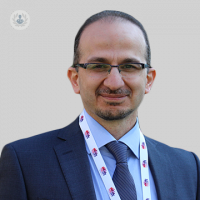Should we close the internal hernia defects after a gastric bypass?
Written by:A gastric bypass operation can be the best way for someone to lose weight. However, problems can arise as a result of this procedure. One such problem is the potential open space that is left in the abdominal fat after dividing the small bowel during the gastric bypass procedure. This space is known as a mesenteric defect. These defects can be problematic as the small bowel may herniate through these spaces, running the risk of cutting off the blood supply and strangulating these hernias. However, surgically closing the mesenteric defect carries its own set of risks as highly respected consultant bariatric surgeon Mr Ali Alhamdani explains:
Several of my fellow surgeons and students have asked me if they should close the mesenteric defect after performing a gastric bypass and if anyone can perform this step or not. This is my advice to them:
The risks: hernias and small bowel obstruction
On one hand, closing mesenteric defects reduces the chances of an internal hernia occurring. On the other hand, there are a number of other possible complications that could be caused by closing the defects, such as bowel obstruction and bleeding.
When I perform a gastric bypass, I close the mesenteric defect. However, I do believe that this is not a straightforward addition to the procedure and has the potential to go very wrong. Therefore, it should only be done by experienced surgeons who have been trained to do it.
A recent paper on a controlled trial of more than 2,500 patients randomised into 2 groups (one whose mesenteric defects had been closed and one whose defects hadn’t been closed after gastric bypass, with follow-ups over the next three years) showed that internal hernias were less frequent in the closure group than the non-closure one. However, it also clearly showed that the incidence of serious post-operative complications (small bowel obstruction) is significantly higher in the closure group.
In other words, we can reduce the incidence of internal hernia if we close the defects, but at the same time increase the incidence of severe post-operative complications like small bowel obstruction and bleeding. If we don’t close it, there is a greater risk of internal hernia but less risk of small bowel obstruction and bleeding.
Dealing with complications
If the defects are closed and complications occur, they are very difficult to treat, since the options are limited. Some procedures may be done via laparoscopic (keyhole) surgery, but the most likely scenario is open surgery, especially in patients with a high BMI.
If the mesenteric defect is not closed at the time of the gastric bypass, the patient will have a higher chance of having an internal hernia. This usually presents 2 years after the bypass procedure when the patient has lost the majority of their excess weight. Laparoscopic surgery to deal with this hernia is much more feasible here; with the patient’s lower BMI, laparoscopic repair has a higher chance of success.
It is important to remember that closure of the mesenteric defect at the time of the gastric bypass is not a guarantee that the patient will have no internal hernias. Moreover, inadequate partial closure can itself cause smaller mesenteric defects, encouraging internal hernias to happen. Furthermore, if the closure is too tight, it can also result in bowel obstruction.
Personally, I tend to close mesenteric defects, but I would always stress that this should only be done after adequate and supervised training to perform this step. All my current junior surgeons go through that training before attempting to close the defect.
To schedule a consultation with Mr Alhamdani, visit his Top Doctors profile today.




